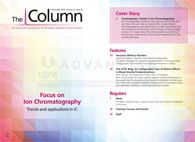Verhaak Receives Agilent Early Career Professor Award
Agilent Technologies Inc. has named Roeland G.W. Verhaak, of the Jackson Laboratory (JAX), the winner of the company’s Early Career Professor Award. Verhaak was selected for his contributions to the implementation of transcriptomics, genomics, and big-data analysis to the classification and diagnosis of various cancer types.
Agilent Technologies Inc. has named Roeland G.W. Verhaak, of the Jackson Laboratory (JAX), the winner of the company’s Early Career Professor Award. Verhaak was selected for his contributions to the implementation of transcriptomics, genomics, and big-data analysis to the classification and diagnosis of various cancer types.
“Agilent is pleased to recognize Dr. Verhaak with this award and to support his important research at JAX,” said Jack Wenstrand, Agilent’s director of university relations and external research.
“Dr. Verhaak is recognized internationally for the development and implementation of workflows for the analysis of big-data from transcriptomics to next generation sequencing approaches. His data-driven, unbiased analyses of cancer genomics and profound understanding of cancer biology are improving our ability to identify clinically relevant subtypes of cancer,” continued Wenstrand.
Established in 2008, the Agilent Early Career Professor Award seeks to recognize the achievements of academic researchers in the early stages of their careers and to establish strong collaborative relationships.
“We’re so pleased that Dr. Verhaak has received this prestigious award in recognition of his outstanding work in advancing human health,” said Charles Lee, Ph.D., FACMG, scientific director and professor at JAX Genomic Medicine.
For more information, please visit: www.agilent.com/about/newsroom/presrel/2016/18oct-ca16031.html

Common Challenges in Nitrosamine Analysis: An LCGC International Peer Exchange
April 15th 2025A recent roundtable discussion featuring Aloka Srinivasan of Raaha, Mayank Bhanti of the United States Pharmacopeia (USP), and Amber Burch of Purisys discussed the challenges surrounding nitrosamine analysis in pharmaceuticals.
Extracting Estrogenic Hormones Using Rotating Disk and Modified Clays
April 14th 2025University of Caldas and University of Chile researchers extracted estrogenic hormones from wastewater samples using rotating disk sorption extraction. After extraction, the concentrated analytes were measured using liquid chromatography coupled with photodiode array detection (HPLC-PDA).









